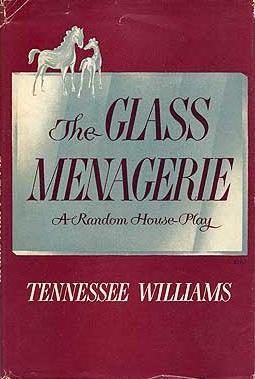The Glass Menagerie: An Escape From the Present and Adventure Through the Past

January 11, 2023
People stress over all sorts of things from being excluded at school to the possibilities of new variants of COVID to the war going on in Ukraine. A way to take a break from stressing and worrying about these daunting things is by using entertainment to escape.
In the The Glass Menagerie, Tennessee Williams tells the story of Tom Wingfield’s memories from 1937 about the struggles his family went through. Tom’s father left his family, which forced Tom to take over as the man of the house and provide for his mother and sister. Tom’s sister Laura is crippled by her disability and social anxiety. Their mother Amanda has demanding expectations for both of her children which causes both Tom and Laura to feel trapped.
Tom tries to escape his obligations to his family by spending most of his free time at the movies. His mother thinks this is a waste of time and yells at him: “‘Nobody in their right minds goes to the movies as often as you’ … ‘You get three hours’ sleep and then go to work’” (Williams 23). Since the 1940s people have been using films to escape their responsibilities, and now people have devices that give them even easier access to movies and television shows. People today even have addictive social media that you can mindlessly scroll through for hours.
Escapism is normally described in a negative manner, but Madilynn Caskey discusses her perspective on how escapism could be positive during her TED Talk titled “The Stigma of Escapism.” Caskey went through a tough period of her life where she had to live in a homeless shelter, and she said that making art was a great way of temporarily forgetting about her harsh realities. She says that escapism is only bad when you are procrastinating, but it is a good thing to distract yourself from the uncontrollable situations.
Tom displays positive escapism when he tries to read books and write poetry to try to cope with the drudgery of working at a shoe warehouse and the pressure of financially supporting his family. Unfortunately, Amanda and his boss prevent him from using these coping mechanisms, which most likely contributed to why he ultimately ends up leaving. By confiscating Tom’s novel, Amanda makes him feel like “[he’s] got no nothing, no single thing … in [his] life here that [he] can call [his] own!” (Williams 21). By reading novels and watching movies Tom feels like he is a part of a larger culture and he is not alone. The authority figures in Tom’s life don’t care that they are making Tom more upset by not allowing him to use his helpful coping mechanisms.
Laura also uses escapism when she retreats to her collection of glass toys whenever she gets overwhelmed. Her glass menagerie allows her to teleport into her own fantasy land where she is in control. Similarly to Madilynn Caskey using her art to express herself, Laura uses her glass unicorn toy to show Jim her true self. Her glass toys help her cope with her social anxiety in a positive way.
However, Laura uses escapism in an unhealthy way also when she goes for long walks instead of taking classes at Rubicam’s Business College. Instead of facing her anxiety about college or telling her mother she wants to drop out, Laura went on walks and pretended everything was fine.
Throughout the play, Williams shows how escapism can be either beneficial or harmful, depending on what you are choosing to escape from. When Tom and Laura use entertainment to distract them from their work it is damaging, but when they use it to get through their struggles it can be a helpful tool. Williams describes characters people can relate to since everyone needs to take a break from the real world sometimes.